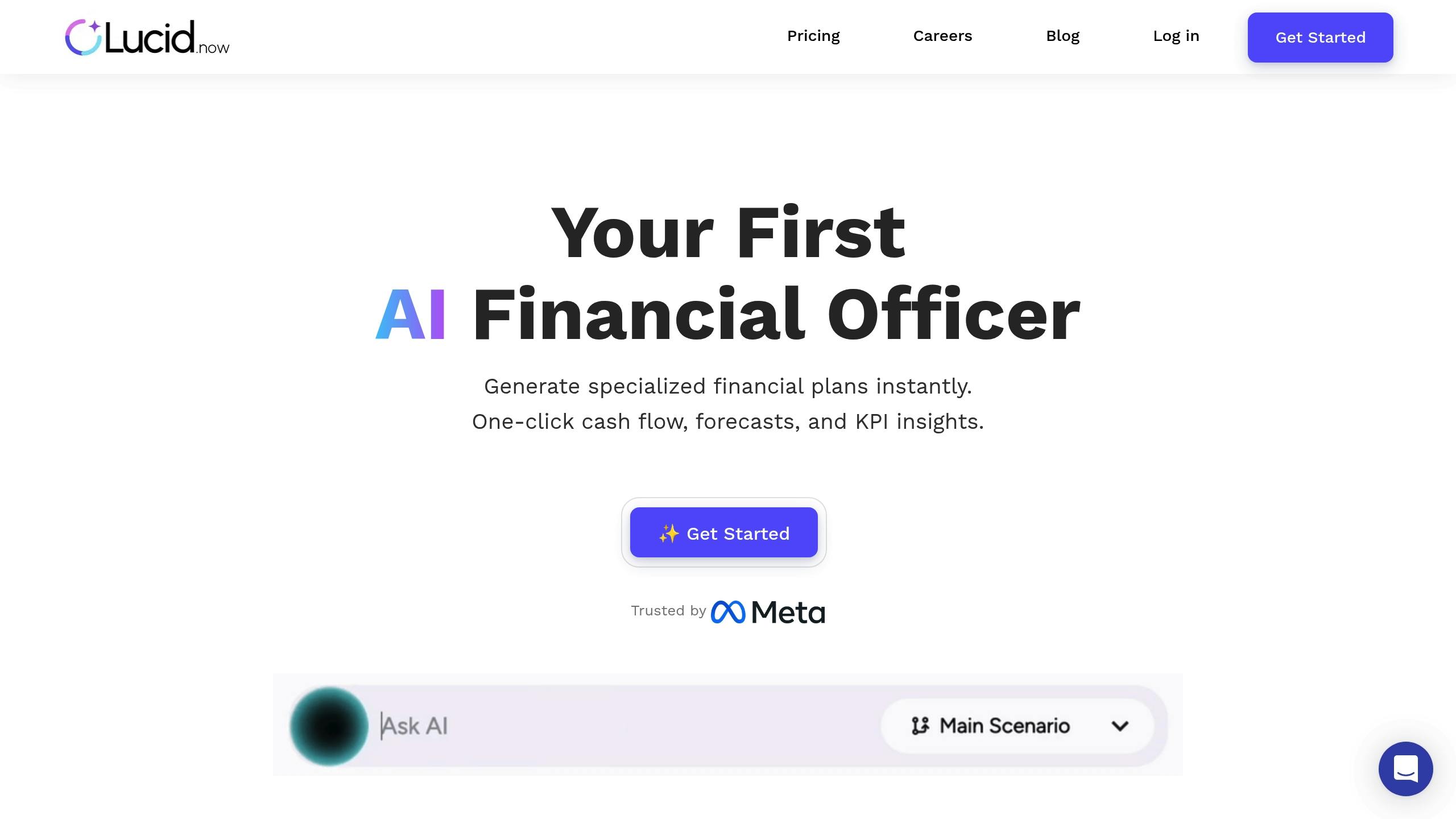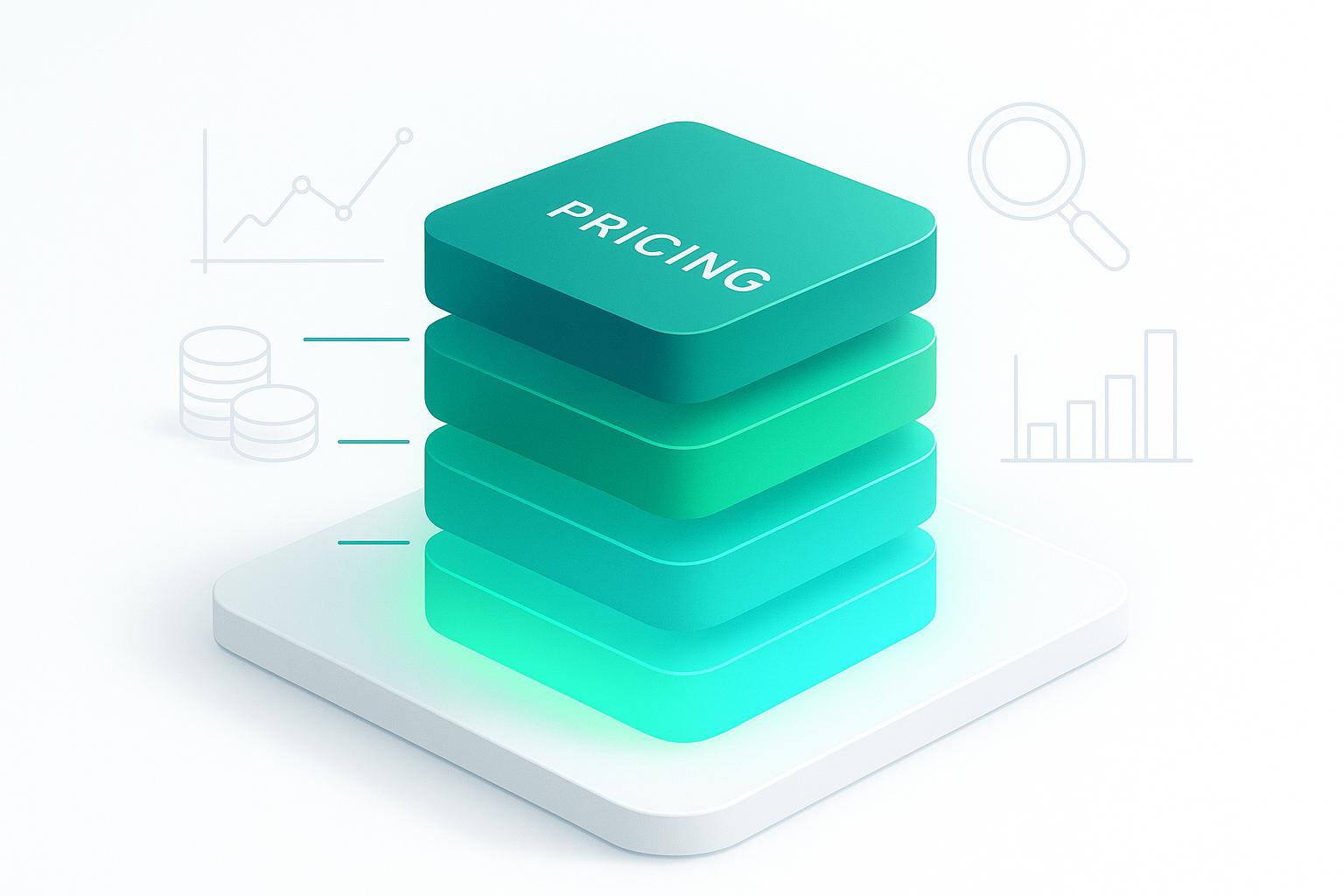AI dashboards are transforming how startups manage finances, offering faster insights, tailored data, and time-saving automation. Here's why they matter:
- Real-Time Analysis: Instantly process cash flow, spending, and market trends for accurate 12-month projections.
- Customized Views: Role-specific insights ensure founders, investors, and teams see only relevant data.
- Automation: Tasks like expense tracking, invoicing, and reporting are automated, saving 60% of time.
- Scenario Planning: Predict challenges and explore multiple growth scenarios for better decision-making.
Startups using AI tools experience 25% higher forecast accuracy and reduce financial planning time by 60%. Tools like Lucid Financials simplify integration, improve decision-making, and support growth planning. Dive in to learn how AI dashboards can streamline your startup's financial management.
Meet the Startup Making Analytics Effortless With AI
Main Advantages of AI Dashboards for Startups
AI dashboards bring several key benefits to startups, making them invaluable tools for financial management and decision-making.
Instant Financial Analysis and Predictions
AI dashboards provide real-time insights into cash flow and spending, using integrated data streams. They analyze past performance and market trends to create 12-month cash flow projections. This helps startups stay ahead of potential challenges and seize new opportunities. These insights lay the groundwork for more accurate and informed decisions.
Smarter Decisions with Customized Data Views
One standout feature of AI dashboards is their ability to deliver insights tailored to individual roles within a startup. Rather than bombarding users with irrelevant data, these tools focus on what matters most to each person. For example, founders can access runway projections, while investors see ROI metrics[1].
This tailored approach significantly boosts efficiency. A recent study found that 83% of early adopters of AI-driven financial tools experienced noticeable productivity improvements[6]. By ensuring every team member gets the data they need, these dashboards streamline decision-making across the board.
Time Savings and Focus on Growth
AI dashboards also cut down on the time spent handling repetitive financial tasks. They automate processes like:
- Expense tracking
- Financial reporting
- Invoicing
- Budget analysis
This automation speeds up financial workflows by 60%, according to industry reports. The time saved can then be redirected toward strategies that drive growth.
Additionally, AI-powered scenario planning tools help startups explore various business outcomes. By identifying patterns and simulating different scenarios, these tools enable better planning for resource allocation, expansion, and investments. This kind of preparation helps startups stay resilient and make smarter choices for long-term growth.
Common Issues When Setting Up AI Dashboards
AI dashboards can make a big difference in financial management, but getting them up and running isn’t always smooth sailing. According to FinTech Magazine, 67% of startups struggle with integration when implementing AI financial tools [1].
Connecting with Existing Finance Software
One of the biggest challenges is linking AI dashboards with current financial systems. Compatibility problems often crop up when syncing tools like QuickBooks or payroll software. Here are some common obstacles:
- Mismatched data formats leading to reporting errors
- API restrictions that interfere with real-time updates
- Issues with migrating and validating historical data
Some platforms, like Lucid Financials, tackle these problems by offering pre-built connectors for popular tools like QuickBooks and payroll systems, as well as direct links to banks [2].
Data Privacy and AI Ethics
Security and ethics are just as important as technical integration. Protecting sensitive financial data requires measures such as:
- Encryption to secure data
- Role-based access to limit who can see what
- Regular security checks to identify vulnerabilities
Beyond security, startups need to stay on top of ethical concerns. For example, the AI Now Institute found that 58% of companies haven’t addressed AI ethics at the board level [5]. To avoid pitfalls, businesses should focus on:
- Transparent decision-making
- Routine checks for algorithm bias
- Clear policies outlining accountability
sbb-itb-17e8ec9
Manual vs AI Dashboard Comparison
Key Differences Between Manual and AI Tools
Studies reveal that 83% of businesses prioritize AI to enhance their financial decision-making processes[4]. Let’s break down how manual and AI dashboards measure up on important metrics:
| Feature | Manual Dashboard | AI Dashboard |
|---|---|---|
| Processing Speed | Hours to days | Real-time/seconds |
| Update Frequency | - | Continuous |
| Customization | Fixed templates | Dynamic adjustment |
These differences give AI dashboards the edge, enabling faster and more flexible financial planning.
AI-Powered Financial Planning
AI dashboards go beyond just faster processing - they bring advanced capabilities to financial planning and forecasting. One standout feature is their ability to analyze complex scenarios. While manual methods might handle 3–4 scenarios, AI can process hundreds in minutes, considering factors like:
- Market conditions
- Pricing strategies
- Growth rates
- Seasonal trends
This depth of analysis allows AI to uncover subtle cash flow patterns that manual methods often miss[1]. In fact, AI reduces forecasting errors by 50% compared to manual approaches[4]. This level of precision is especially critical for startups that need to adjust plans quickly, as discussed earlier.
Lucid Financials: AI Dashboard Example

Lucid Financials Main Features
Lucid Financials highlights how AI can streamline financial management for startups. Here's a breakdown of its key features:
| Feature Category | Capability | Startup Benefit |
|---|---|---|
| Real-Time Analysis | Instant financial plans and live data processing | Cuts planning time from days to minutes |
| Smart Integration | Role-specific dashboard views | Removes the need for manual data entry |
| AI Forecasting | Multi-scenario modeling with industry benchmarks | Supports informed strategic decisions |
| Team Management | Analyzes industry salary data for planning | Improves workforce and budget management |
The platform combines data from multiple sources to provide insights tailored to specific roles and business goals [7]. Dashboards update dynamically, showcasing the most relevant metrics and actionable recommendations [7].
How Startups Use Lucid Financials
Startups leverage Lucid Financials differently depending on their stage and requirements. With tiered pricing, the platform caters to a range of needs - from free plans for early-stage startups to enterprise solutions for scaling businesses.
Some common uses include:
- Financial Forecasting: AI tools examine historical data and market trends to deliver precise predictions [7].
- Investor Relations: Generates polished, professional reports for stakeholders [3].
- Growth Planning: Simulates cash flow impacts of growth scenarios using integrations with existing software [4].
Lucid also assists with workforce planning by analyzing burn rates, salary benchmarks, and market conditions in real time [3]. This level of detail supports startups in making smarter, more tailored decisions, aligning with the strategic planning goals mentioned earlier.
Conclusion: AI Dashboards Drive Startup Success
AI-powered financial dashboards are now crucial for managing startup finances. They help startups make faster, more confident decisions by analyzing financial data from multiple sources and turning it into actionable insights. Platforms like Lucid Financials showcase this ability by delivering real-time data processing across connected systems.
These tools have reshaped startup operations in three main ways:
-
Resource Optimization
With workflow speeds improving by 60%, as noted earlier, AI dashboards empower lean teams to allocate resources more effectively. By automating financial insights, they make critical data accessible to everyone - from founders to operational teams - streamlining decisions at every level[1][4]. -
Strategic Planning
Predictive analytics powered by AI have changed how startups plan for the future. These systems provide role-specific insights and predict operational needs, helping businesses tackle challenges before they escalate[1]. -
Growth Management
AI integration in financial planning enables startups to scale while keeping a close eye on real-time financial performance. Tools like these allow businesses to maintain control through advanced scenario modeling, ensuring smooth growth without losing oversight.


